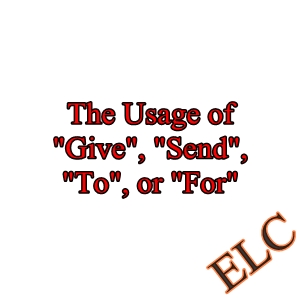Verbs like give and send can have two objects, or they can have an object and an adverbial. There are some examples in this conversation, which takes place in a department store.
- Customer: I've bought these sweaters, and I'm taking them home to Brazil. I understand I can claim back the tax I pay.
- Clerk: That's right. Have you filled in a form?
- Customer: Yes, and I've got the receipts here.
- Clerk: Right. Now, when you go through British Customs, you give the customs officer the form with the receipts.
- Customer: I give the form to the Customs when I leave Britain?
- Clerk: That's right. They'll give you one copy back and keep one themselves.
- Customer: Uh-huh.
- Clerk: Now I'll give you this envelope. You send the copy back to us in the envelope.
- Customer: I post it to you.
- Clerk: That's right.
- Customer: And how do I get the money?
- Clerk: Oh, we send you a cheque. We'll send it off to you straight away.
1. Two objects
When the verb has two objects, the first is the indirect object and the second is the direct object.
Indirect object - Direct object
You give the customs officer the form.
We send you a cheque.
The man bought the woman a diamond ring.
I can reserve you a seat.
Here the indirect object refers to the person receiving something, and the direct object refers to the thing that is given.
When the verb has two objects, the first is the indirect object and the second is the direct object.
Indirect object - Direct object
You give the customs officer the form.
We send you a cheque.
The man bought the woman a diamond ring.
I can reserve you a seat.
Here the indirect object refers to the person receiving something, and the direct object refers to the thing that is given.
2. Object + adverbial
Instead of an indirect object, we can use a prepositional phrase with to or for.
Direct object + Prepositional phrase
I give the form to the Customs.
You send the copy to us.
The man bought a diamond ring for the woman.
I can reserve a seat for you.
The adverbial comes after the object.
3. Which pattern?
In a clause with give, send etc, there is a choice of pattern between give the customs officer the form and give the form to the customs officer. The choice depends on what information is new. The new information goes at the end of the clause.
In a clause with give, send etc, there is a choice of pattern between give the customs officer the form and give the form to the customs officer. The choice depends on what information is new. The new information goes at the end of the clause.
I'll give you this envelope.
In the conversation Claiming back tax, this envelope is the point of interest, the new information, so it comes at the end.
Compare the patterns in these sentences.
He left his children five million pounds.
(The amount of money is the point of interest.)
He left all his money to a dog's home.
(Who receives the money is the point of interest.)
NOTE
a The adverbial or indirect object is often necessary to complete the meaning.
He handed the receipt to the customer.
But sometimes it is not necessary to mention the person receiving something.
You'll have to show your ticket on the train.
(It is obvious that you show it to the ticket inspector.)
I'm writing a letter.
(You don't want to say who you are writing to.)
b Most verbs of speech cannot take an indirect object, but we can use a phrase with to.
The man said nothing (to the police).
But, tell, almost, always have an indirect object.
The man told the police nothing.
4. Pronouns after give, send etc
When there is a pronoun, it usually comes before a phrase with a noun.
We send you a cheque.
He had lots of money, but he left it to a dogs' home.
When there are two pronouns after the verb, we normally use to or for.
We'll send it off to you straight away.
I've got a ticket for Wimbledon.
When there is a pronoun, it usually comes before a phrase with a noun.
We send you a cheque.
He had lots of money, but he left it to a dogs' home.
When there are two pronouns after the verb, we normally use to or for.
We'll send it off to you straight away.
I've got a ticket for Wimbledon.
Norman bought it for me.
5. To or for?
Some verbs go with to and some with for.
He handed the receipt to the customer.
Tom got drinks for everyone.
Some verbs go with to and some with for.
He handed the receipt to the customer.
Tom got drinks for everyone.
With to: award, bring, feed, give, grant, hand, leave (in a will), lend, offer, owe, pass,
pay, post, promise, read, sell, send, show, take, teach, tell, throw, write.
With for: bring, buy, cook, fetch, find, get, keep, leave, make, order, pick, reserve,
save, spare.
NOTE
a. Bring goes with either to or for.
b. For meaning 'to help someone' can go with very many verbs.
I'm writing a letter for my sister. (She can't write.)

Komentar
Posting Komentar